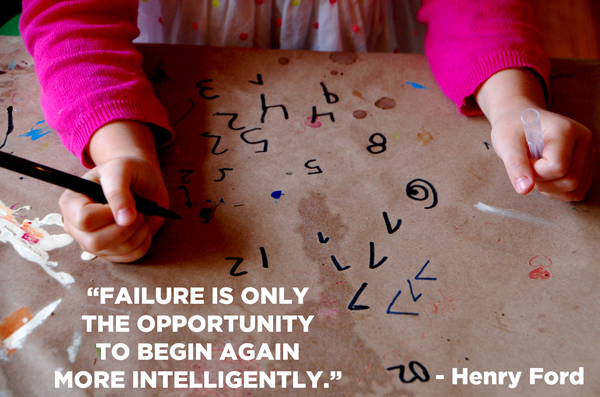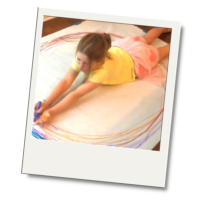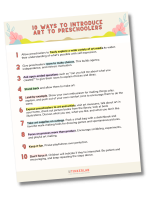“Failure is only the opportunity to begin again more intelligently.”
– Henry Ford
What do you think about failure? Do you encourage your child to make mistakes? Do you celebrate attempts to try new things? Do you share your own failed attempts freely with your child?

Last night was Back to School Night at my new kindergartener’s school. The principal gave a motivating talk about the importance of extending the school’s core values into our children’s home lives as a way to reinforce the home-school connection.
At the end of the presentation the principal talked about failure, and how we should encourage our children to work hard to achieve their ideas and goals in spite of their lack of knowledge. If they don’t know how to do something, they shouldn’t see this as a limitation but as an opportunity to fail forward as they learn through the process of trying.
As you can imagine, I LOVED this talk and felt so grateful that my daughter landed in an environment with such entrepreneurial spirit at its heart.
At the end of the talk, they shared a link to an interview with the youngest female self-made billionaire, Sarah Blakely (founder of Spanx), who discussed her journey with ABC News. Whatever you might think of Spanx (I don’t own any myself), you’ll appreciate how her father redefined the word failure for her and her brother.
“We would sit around the dining room table at night and he would say, ‘OK, kids, what did you fail at today?’ I would say, ‘Dad, I tried out for this sport and I was horrible,’ and he would say ‘way to go,’ and high five me. And it completely reset my definition of failure. So, for my brother and me, failure is not trying.”

Parents and Teachers as Co-Learners
It’s so important to model our own failures to our children. If children don’t see us struggle as we try new things, and in turn find ways to overcome setbacks, how can we ever expect them to do the same?
When was the last time you celebrated a failure with a child? Not too long ago I baked a new recipe with my kids. We thought we could alter the recipe to use up some of our pantry ingredients and talked about experimentation as we went along. In end the recipe was a disaster, but it was a fantastic opportunity to discuss how we could do it differently next time. Some of the things that came up: follow the recipe more closely, take more time with fewer distractions, and don’t use so much pumpkin.
If you’re interested in this topic, you might enjoy this post on failure.
A question for you:
When was the last time you tried something new? Did you succeed on your first attempt? If not, what did you have to do in order to achieve your goal?




Thank you for sharing this–Mistakes & Failures are such an important part of learning. We adults need to remember this, for our own development, as well as when encouraging our children’s learning/passions.
The short piece on the Spanx founder was very inspiring, too–Thanks, again.
Hi Lisa,
I’m so glad to hear that this resonates with you. When I make mistakes in front of my kids, I try to laugh at myself to help them see how inconsequential small “failures” can be.
Rachelle
This is very timely for me to think about. My sweet 4-year-old daughter starts school next week. In her school they refer to this as “resilience” – learning how to handle things when you don’t succeed first time. I know my little girl struggles with this, and I’ve been looking all over the place for ways to help her. I think just straight up discussing what her father and I have failed in today might be a great tool in teaching her! Thank you 🙂
Hi Joy,
It’s fascinating how various approaches can work for different children. I’d love to hear how/if this strategy helps your daughter.
xo, Rachelle
This is one of the things I struggle with with my son. Both he and I are perfectionists, and he gets very frustrated when his experiments (usually building projects) do not work the first time. I try to convince him to think of a different way to do it or try again, but he can be very stubborn. Thank you for sharing – I believe in the importance of failure and perseverance, and welcome any input on ways to teach my son the importance of failure, too.
Hi Natalie, How old is your son? Perhaps a little drama could help? If you’re not already doing this, you could build something alongside him, and then make a mistake. Act frustrated or laugh at yourself, and then say something like, “whoops, that’s not what I meant to do. How can I fix this problem?” If he sees that you’re struggling in the same way, it might be easier to help you with YOUR problem than his.
This is just the kind of question that my Facebook friends like to help solve — I hope it’s okay if I post it over there. I’ll add a link to this thread so you can see the responses.
https://www.facebook.com/tinkerlab/posts/560819993955566
Thank you! I have been following the post on Facebook and found some valuable tips.
Love that quote and this post!
A while back I posted about being ok if my girls failed their very first tap dancing exam… I know how much my kids have grown from trying something difficult and succeeding, but I also realise that they grow from failing and getting up and trying again… but I also love this idea, that failure itself is just another part of life, not bad, just part of trying!
Exactly, Kate! I love this: Failure is just another part of life, not bad, just trying!
And that’s a fantastic post, totally worth sharing here: https://picklebums.com/2013/06/06/why-im-ok-with-my-kids-failing/
I love this post!
Just last night my LO & I made our own version of a paint/cornstarch recipe we found on line. It was a disaster …
You know, at the end of it though, LO was painting and we made beautifully finished product once dryed. what’s the relation?
I was the ONLY one who saw it as a failure ;D !
Sometimes our version doesn not have to be theirs as well lol! THANK YOU SO MUCH for this post also ecuase I spend my days comparing my work to others and it dented my creative spirit! I have not been able to successfully create since. I could do with some of my own “TRYING” cuz I have given up all together! thank you!
Hi Jeanine,
I took a Thanksgiving break and apologize for taking so long to respond to your thoughtful comment. I loved reading your story, and how you were able to turn this experience into something worthwhile. Oftentimes, children’s experimental mindset carries them smoothly through experiences that adults might deem as disasters. To children, these same moments are opportunities to learn, play, and test the limits of materials. Just keep in mind that everything in our world is invented, and the only reason we think that there’s a “right” way is because someone deemed it so. Carry forward and trust your intuition and ideas. The confidence I’ve seen in my own children has certainly given me more strength.
Rachelle
[…] As you test and try out different set-ups, you’ll undoubtedly fail a few times. I could have filled a 20 minute video with outtakes from all our misses (the balloon is a good example of that). But this is great news! Failure is an intrinsic piece of the invention process, and without these mistakes we won’t learn how things really work. So embrace failure and celebrate it as part of the learning process. […]